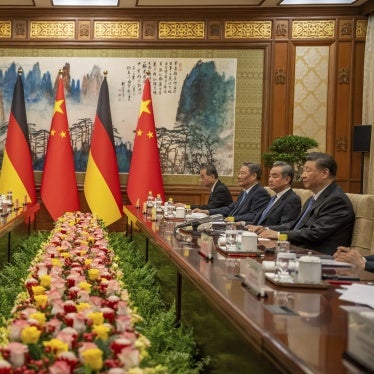(New York) - Human Rights Watch today welcomed the release of Wei Jingsheng, China's most famous dissident, as proof that the Chinese government is responsive to sustained international pressure.
"This is very good news indeed," said Sidney Jones, executive director of Human Rights Watch/Asia, "and a tribute both to the will and courage of a remarkable man and to the efforts of the Clinton administration, other governments, and concerned individuals around the world who worked for his release. It is deplorable, however, that the Chinese government remains so intolerant of dissent that Mr. Wei can only gain his freedom on the apparent condition that he go into exile."
Ms. Jones also stressed that the release of one man, however important, must not be seen as indicative of major human rights improvements in China. "The timing of this release -- after President Jiang Zemin's visit to Washington and before the Chinese Minister of Justice arrives in the U.S. -- suggests that it is a direct outcome of the summit. It is consistent with the hostage politik' that Chinese leaders have pursued since 1989: when they need to offer a concession for political reasons, they release someone they never should have arrested in the first place. When the political climate permits, they arrest a few more as bargaining chips for the next time around. In terms of the overall human rights situation, Mr. Wei's release changes little."
Human Rights Watch points out that arbitrary detention of those who peacefully challenge the political system continues; that ill-treatment and denial of medical care for prisoners remains widespread; that outside access to China's enormous prison system remains banned; that Tibet remains virtually closed to foreign journalists and human rights monitors; that religious persecution persists; and that worker rights continue to be violated with impunity.
"We will continue to work for the release of all those unfairly detained in China," said Ms. Jones. "But as Mr. Wei himself will no doubt point out, the problem goes far beyond prisoners."
At the time of his release, Wei Jingsheng was in the second year of a fourteen-year sentence for advocating democratic reform. It was the second lengthy sentence for the former electrician for the Beijing Zoo. Now forty-eight, he was first jailed in 1979 for his participation in the Democracy Wall movement. His now-famous essay, entitled "The Fifth Modernization," argued that in addition to four kinds of modernization advocated by Deng Xiaoping, China also needed democracy. That essay was followed by another calling Deng an autocrat. For these actions, Wei Jingsheng was sentenced on October 16, 1979 to fifteen years in jail, although he was formally accused of leaking state secrets and "counterrevolutionary propaganda." As shown in the recently-published collection of his prison letters, entitled The Courage to Stand Alone, his treatment in prison was harsh. He spent long periods in solitary confinement, and his health deteriorated sharply. In late 1993, he was released in what was widely interpreted as an attempt by China to deflect human rights criticism in pursuit of its ultimately unsuccessful bid to host the 2000 Olympic Games. Wei immediately went back to advocating political reform, meeting with activists, journalists, and others, and writing for foreign and domestic publications. On April 1, he was again taken into custody and has been detained ever since. He was found guilty in his December 1995 trial of "counterrevolution." In 1996, he won the Sakharov Award for Human Rights.






